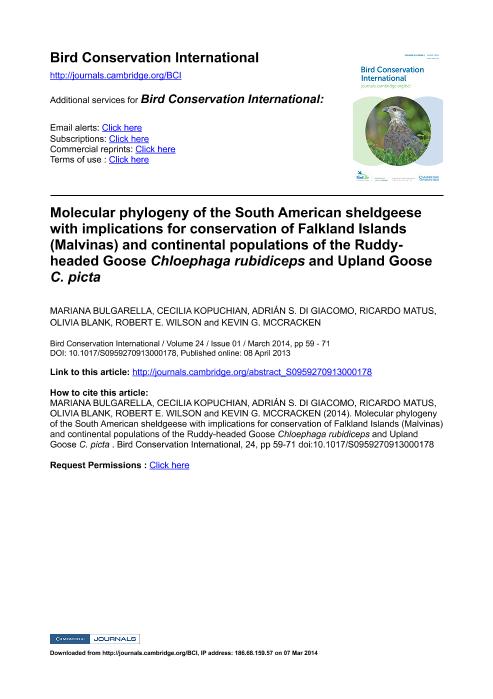Artículo
Molecular phylogeny of the South American sheldgeese with implications for conservation of Falkland Islands (Malvinas) and continental populations of the Ruddy-headed Goose Chloephaga rubidiceps and Upland Goose C. picta
Bulgarella, Mariana; Kopuchian, Cecilia ; Di Giacomo, Adrian Santiago
; Di Giacomo, Adrian Santiago ; Matus, Ricardo; Blank, Viviana Claudia
; Matus, Ricardo; Blank, Viviana Claudia ; Wilson, Robert E.; McCracken, Kevin G.
; Wilson, Robert E.; McCracken, Kevin G.
 ; Di Giacomo, Adrian Santiago
; Di Giacomo, Adrian Santiago ; Matus, Ricardo; Blank, Viviana Claudia
; Matus, Ricardo; Blank, Viviana Claudia ; Wilson, Robert E.; McCracken, Kevin G.
; Wilson, Robert E.; McCracken, Kevin G.
Fecha de publicación:
03/2014
Editorial:
Cambridge University Press
Revista:
Bird Conservation International
ISSN:
0959-2709
Idioma:
Inglés
Tipo de recurso:
Artículo publicado
Clasificación temática:
Resumen
Sheldgeese of the genus Chloephaga are waterfowl (Anatidae) endemic to mainland South America and the Falkland Islands (Malvinas). Continental populations of three species C. picta, C. poliocephala, and C. rubidiceps breed in Patagonia and Tierra del Fuego and migrate northwards to winter in central Argentina and Chile. These continental populations have declined by > 50% in the past 30 years due to direct hunting to control crop damage and by the introduction of the grey fox Dusicyon griseus to their breeding grounds in Tierra del Fuego. The continental population of C. rubidiceps is critically endangered, estimated to be < 1,000 individuals. While no historic population size estimates exist for C. rubidiceps in its wintering grounds, the breeding population in Tierra del Fuego was estimated to number several thousand individuals in the 1950s. In contrast, the C. rubidiceps population in the Falkland Islands (Malvinas) is non-migratory and stable with > 42,000 individuals, as is the Falkland Islands (Malvinas) population of C. picta leucoptera with > 138,000 individuals. Here we use sequence data from the mitochondrial DNA control region to quantify genetic divergence between insular and continental populations of these two species of sheldgeese. Chloephaga rubidiceps and C. picta showed significant intraspecific differentiation of 1.0% and 0.6%, respectively. In both cases, mainland and insular populations were reciprocally monophyletic and did not share mtDNA haplotypes. These results suggest that the insular and continental populations of C. rubidiceps and C. picta are genetically distinct and that female-mediated gene flow is restricted. We recommend a reevaluation of the threat category status of the continental C. rubidiceps population, under IUCN guidelines. It is necessary to implement urgent actions for the conservation of this critically endangered population.
Palabras clave:
Chloephaga
,
Conservation
,
Malvinas Islands
,
Phylogenetics
Archivos asociados
Licencia
Identificadores
Colecciones
Articulos(CECOAL)
Articulos de CENTRO DE ECOLOGIA APLICADA DEL LITORAL (I)
Articulos de CENTRO DE ECOLOGIA APLICADA DEL LITORAL (I)
Citación
Bulgarella, Mariana; Kopuchian, Cecilia; Di Giacomo, Adrian Santiago; Matus, Ricardo; Blank, Viviana Claudia; et al.; Molecular phylogeny of the South American sheldgeese with implications for conservation of Falkland Islands (Malvinas) and continental populations of the Ruddy-headed Goose Chloephaga rubidiceps and Upland Goose C. picta; Cambridge University Press; Bird Conservation International; 24; 1; 3-2014; 59-71
Compartir
Altmétricas



